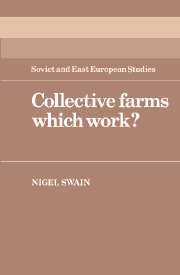Book contents
- Frontmatter
- Contents
- Preface
- Introduction
- PART I ‘FAMILY LABOUR’ AND ‘SOCIALIST WAGE LABOUR’ IN HUNGARY'S CO-OPERATIVE AGRICULTURE: THE INCORPORATION OF PETTY COMMODITY PRODUCTION
- PART II MEMBERS AND MANAGERS
- PART III MANAGERIAL CONTROL IN AGRICULTURE
- 5 Co-operative management's autonomy
- 6 The exercise of managerial control in agriculture
- Conclusion
- Appendix I The transformation of Hungarian agriculture
- Appendix II Ancillary enterprises within agricultural co-operatives: number of units engaged in non-agricultural activity
- Notes
- References and bibliography
- Index
5 - Co-operative management's autonomy
Published online by Cambridge University Press: 10 December 2009
- Frontmatter
- Contents
- Preface
- Introduction
- PART I ‘FAMILY LABOUR’ AND ‘SOCIALIST WAGE LABOUR’ IN HUNGARY'S CO-OPERATIVE AGRICULTURE: THE INCORPORATION OF PETTY COMMODITY PRODUCTION
- PART II MEMBERS AND MANAGERS
- PART III MANAGERIAL CONTROL IN AGRICULTURE
- 5 Co-operative management's autonomy
- 6 The exercise of managerial control in agriculture
- Conclusion
- Appendix I The transformation of Hungarian agriculture
- Appendix II Ancillary enterprises within agricultural co-operatives: number of units engaged in non-agricultural activity
- Notes
- References and bibliography
- Index
Summary
The aim of this chapter is to examine the constraints under which co-operative farm management operates so as to isolate the areas where it enjoys real autonomy. Labour in this chapter becomes again an economic category, a factor of production, a ‘force of production’ which management may, or may not, be in a position to control. The chapter falls into four sections: first, the relationship between the co-operative and the organs of local government with respect to economic planning is considered; second, the role of the Party machine within this relationship is examined; third, the areas in which management has scope for autonomous economic decision-making are delimited; and, fourth, the institutions of co-operative democracy are described and their performance evaluated. All four steps are necessary to establish who it is that exercises economic control on co-operative farms and the constraints, both from above and below, under which they operate.
The first question concerns the way in which plans received by the ministry are transmitted to individual co-operative farms. There is no need to repeat here the outline of the planning process, from national plan conception by the central planners to the receipt by the ministry of plan targets, presented in the introduction. The Ministry of Agriculture and Food Supply enjoys no special status in this respect. But agriculture does have some unique features which require comment. Unlike the situation in Hungarian industry where, until the most recent changes at least, oligopoly has reigned (Radice, 1981, p. 117) with each ministry being responsible for a handful of mammoth enterprises, in agriculture there is no oligopoly.
- Type
- Chapter
- Information
- Collective Farms which Work? , pp. 133 - 161Publisher: Cambridge University PressPrint publication year: 1985



